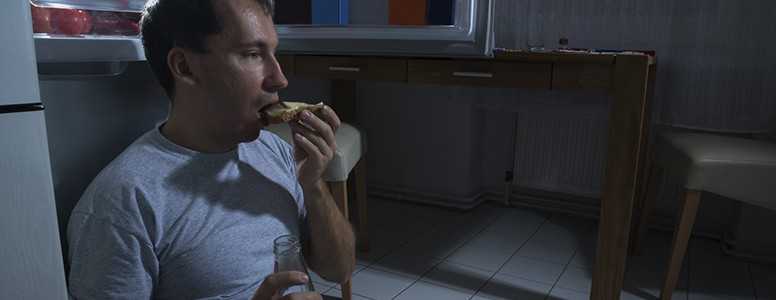Sleeping for less than seven hours per night is linked to more time spent on “secondary” eating and drinking, according to new research.
The study, conducted by researchers at the University of Alabama, Birmingham’s (UAB) Department of Epidemiology, sheds more light on the link between sleep deprivation and obesity and type 2 diabetes.
What is “secondary eating”?
It is well established that deprived, inconsistent sleep patterns increase the risk of type 2 diabetes by disrupting circadian rhythms, but this study provides a second link. “Secondary eating and drinking,” also known as “unconscious eating and drinking,” refers to eating and drinking done while distracted by other activities such as television or a computer screen. Essentially, any time of eating during which one doesn’t focus on the act of eating is secondary eating.
During secondary eating, we tend to eat less healthy things, and we tend to eat a lot more of them. Lots of secondary eating is linked to a higher risk of type 2 diabetes and obesity.
People with type 2 diabetes who have trouble sleeping, or sleep for less than seven hours a day for any other reason, may find themselves unconsciously eating more often. If so, addressing the lack of sleep might be more important than trying to stop unconsciously eating. Get a better night’s sleep and the unconscious eating might take care of itself.
How was the study conducted?
The researchers analysed data from 28,150 adults. 55.8 per cent of participants were female and between the ages of 21 and 65. The participants had also taken part in the American Time Use Survey between 2006 and 2008.
The researchers found that participants who slept for less than seven hours a day also spent more time engaging in secondary eating – 8.7 minutes more per day, on average. They also spent 28.6 minutes more on secondary drinking during weekdays, and 31.28 minutes on weekends.
Because sleep was the only independent variable, the researchers concluded that it was sleep deprivation that caused the increase in secondary eating and drinking.
“Short sleep is associated with more spent in secondary eating and, in particular, secondary drinking,” the researchers wrote. “This potentially suggests a pathway from short sleep to increased caloric intake in the form of beverages and distracted eating and thus potential increased obesity risk, although more research is needed.”
The findings are published in the American Journal of Health Promotion.
Sleep and diabetes
Sleep and diabetes are strongly linked, with research showing a connection between sleep deprivation and insulin resistance. That said, sleep deprivation can in fact be caused by high blood glucose levels. To improve your sleep, make sure that blood glucose levels are under control, stick to a regular bedtime, and exercise regularly (although not immediately before bed).
What's new on the forum? ⭐️
Get our free newsletters
Stay up to date with the latest news, research and breakthroughs.






